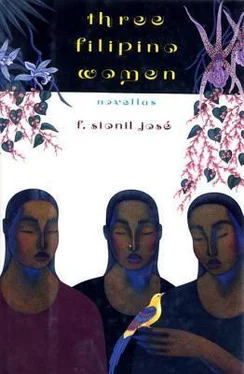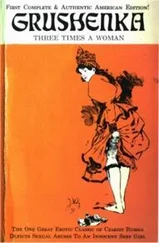Francisco Jose - Three Filipino Women
Здесь есть возможность читать онлайн «Francisco Jose - Three Filipino Women» весь текст электронной книги совершенно бесплатно (целиком полную версию без сокращений). В некоторых случаях можно слушать аудио, скачать через торрент в формате fb2 и присутствует краткое содержание. Год выпуска: 2013, ISBN: 2013, Издательство: Random House Publishing Group, Жанр: Современная проза, на английском языке. Описание произведения, (предисловие) а так же отзывы посетителей доступны на портале библиотеки ЛибКат.
- Название:Three Filipino Women
- Автор:
- Издательство:Random House Publishing Group
- Жанр:
- Год:2013
- ISBN:978-0-307-83028-9
- Рейтинг книги:4 / 5. Голосов: 1
-
Избранное:Добавить в избранное
- Отзывы:
-
Ваша оценка:
- 80
- 1
- 2
- 3
- 4
- 5
Three Filipino Women: краткое содержание, описание и аннотация
Предлагаем к чтению аннотацию, описание, краткое содержание или предисловие (зависит от того, что написал сам автор книги «Three Filipino Women»). Если вы не нашли необходимую информацию о книге — напишите в комментариях, мы постараемся отыскать её.
and
-examine the Philippine experience through the lives of three female characters, a prostitute, a student activist, and a politician.
Three Filipino Women — читать онлайн бесплатно полную книгу (весь текст) целиком
Ниже представлен текст книги, разбитый по страницам. Система сохранения места последней прочитанной страницы, позволяет с удобством читать онлайн бесплатно книгу «Three Filipino Women», без необходимости каждый раз заново искать на чём Вы остановились. Поставьте закладку, и сможете в любой момент перейти на страницу, на которой закончили чтение.
Интервал:
Закладка:
He wanted to see what it was that had cut her so we went back to their yard and when Father saw it, he said, “I’d better give you anti-tetanus serum.”
A general practitioner, Father tried to make do without the sophisticated equipment of hospitals but he was always careful. I remember him telling me that about eighty percent of human ailments could be naturally cured by the body without the assistance of either medicines or doctors. But tetanus is tetanus. He decided to have an allergy test first, just giving Narita a bit of injection under the skin. Within seconds she had turned bluish, her eyes dilated and she fell into a faint.
Father blanched. Fortunately, he was prepared for such emergencies. He immediately gave her an anti-allergy shot and when she revived she described how strange she felt and how suddenly everything started to blur and turn black.
“You are allergic to anti-tetanus serum,” Father said gravely. “I hope you will not forget that …”
I felt guilty and sad for her because her face was disfigured but she just laughed. When the wound healed, there was an indention where the scab had lifted and, in time, the scar itself disappeared. She has had that cleft chin since and, as she herself said, she looked prettier with it.
As an only child, Narita had plenty of time to be alone and it was only later that I learned how much of this time was spent in reverie, daydreams about going away, far away from Santa Ana and its numbing constrictions.
She did not have pets except a big, white cat. She starved the animal once when she came upon a nest of mice in their yard. She placed the hungry cat in a wire-mesh cage where once her father kept his fighting cocks. Then she brought out two of the grown-up mice and put them in the cage. I shudder every time I recall how she sat before that cage, her eyes impassive but alert, watching the cat pounce on the poor, shrieking rodents.
“It is the way of the world, Eddie,” she told me years later when I recalled this. “The strong tearing apart the weak …”
As a boy, I was wary of some of the things Narita wanted me to do no matter how easy or innocuous they seemed. One April afternoon we were in the weedy section of their wide yard. The pomelo trees were laden with ripening fruit and she pointed to a rise in the ground as the best place for me to stand so that I could reach the big oranges that dangled over our heads. I went up the low mound without question only to run from it immediately for a host of giant red ants were all over my legs and biting me. It was an anthill that she had told me to stand on. I was on the verge of tears and she broke out laughing at my misery. I forgave her for this.
We were together again from first year to senior year in the local high school. I cannot say honestly that I did not have any feelings for Narita other than those shared by two childhood friends. Such feelings, however, were dampened by the fact that she had grown taller than I.
By this time, too, she started to confide to me those things which even my sisters did not tell me: how it was when she had her first menstruation, how it felt when her breasts started growing, how itchy they were that she had to put plaster bands on them, personal things which, in retrospect, seem to have been the basis of our relationship.
I remember that day the girls wore their gala uniform — white with blue collar — the school colors. It was the school’s Foundation Day and, as usual, it was Narita who led the singing of the national anthem. When she got up from her seat, there it was for all to see, the red smudge on her behind. There was twittering among the girls and I had a good mind to go tell her that the menstrual blood had dripped right through. And that was what I did when we filed out of the hall. But she whispered into my ear, her eyes filled with laughter, “I am not due till the fifteenth — as if you didn’t know! That’s just pig blood — I sat on it early this morning in Mama’s stall.”
When we were in our senior year, as everyone expected, she became the queen during our High School Day. She had bloomed. I am sure there were men in town who went to her mother’s stall just to look at her. She also sang in the church choir regularly and one could always pick out that rich, mellow voice; she did not linger long in the high notes but she could maintain her voice in the higher reaches. I beat her in literature and history but she was better than I was in math, in philosophy and physics, “the subjects that mattered.”
Before she became high school queen, her father, who had by then taken to drinking and gambling, became very ill and would have died had not Father taken him to the provincial hospital; it was a rather complicated move. Knowing how government was, Father got a letter from Senator Reyes, builder of the hospital and one of the richest and most powerful men in the country. The senator came from our province and Father knew him.
In a way, we had always been entwined with their lives. Don Carlos — her father loved being called that though there was nothing affluent or distinguished about him — stayed for quite a time in the hospital with all sorts of complications of the liver, the heart, and whatever else can ravage a man who has indulged and abused himself.
“All the meat in the market and all the money in the municipal treasury,” my mother used to say, “cannot pay for the bills.”
We wondered where they would get the money but as luck would have it, Senator Reyes stood by them and for a very good reason. When he came to Santa Ana to crown our high school queen, he had brought along his youngest and only living son, Lopito, who was then in his early thirties. Lopito looked at Narita once and did not care for anything after that but to have the beautiful virgin as his wife. Senator Reyes was more circumspect. The girl’s personality satisfied him but he wanted to know more about her and her background. This was readily supplied by Father and others in the town whom he had questioned. It was no secret then that when Narita finished high school, great things would be in store for her.
I did not like it: Lopito barging into our street in his fancy sports car, with his driver honking before the old battered house, and Narita coming out all smiles; and their driving together, raising billows of dust as they went to the beach or wherever their fancy took them while her father lay dying in the hospital and her mother toiled in the meat stall. It would have been better if they married but Senator Reyes had other ideas — they would not marry till she finished college.
I left for Manila in a black mood one April morning, a week after we had graduated from high school. Narita was valedictorian. She had delivered the graduation address with feeling, saying it was time for all of us to part, and Senator Reyes who had come again to give the commencement address had looked at her with pride. In the audience, all of us knew what would happen, that she would go to Manila, too, and be his daughter-in-law. And, years later, I was to realize why Senator Reyes had banked so much on her. Of his four sons only the youngest, Lopito, was alive; two had died and one, an artist, had disappeared in Europe. His two girls had married badly in spite of the fact that their husbands were handpicked by the old man. From all appearances, Senator Reyes had wanted to build a dynasty, as was the practice of most politicians, but had failed. He was not a great believer in heredity. After all, he had often said that it was brains that determined survival and triumph, and he unerringly saw all the virtues that he sought in Narita.
I could not leave without saying good-bye. She was in the yard sweeping the dry leaves of the pomelo trees and she asked me to stay a while. I felt very depressed.
Читать дальшеИнтервал:
Закладка:
Похожие книги на «Three Filipino Women»
Представляем Вашему вниманию похожие книги на «Three Filipino Women» списком для выбора. Мы отобрали схожую по названию и смыслу литературу в надежде предоставить читателям больше вариантов отыскать новые, интересные, ещё непрочитанные произведения.
Обсуждение, отзывы о книге «Three Filipino Women» и просто собственные мнения читателей. Оставьте ваши комментарии, напишите, что Вы думаете о произведении, его смысле или главных героях. Укажите что конкретно понравилось, а что нет, и почему Вы так считаете.












